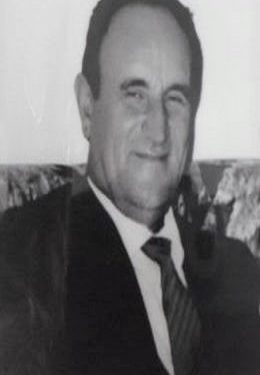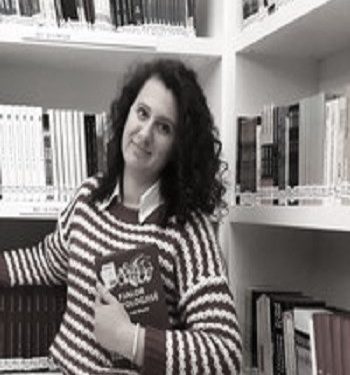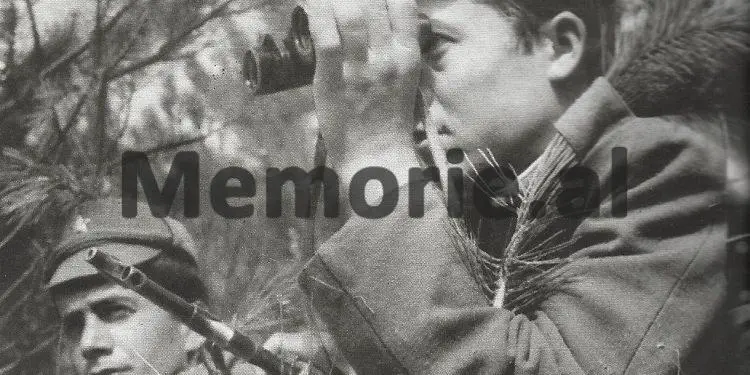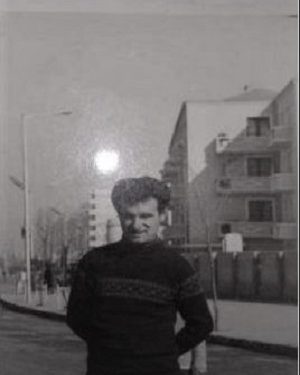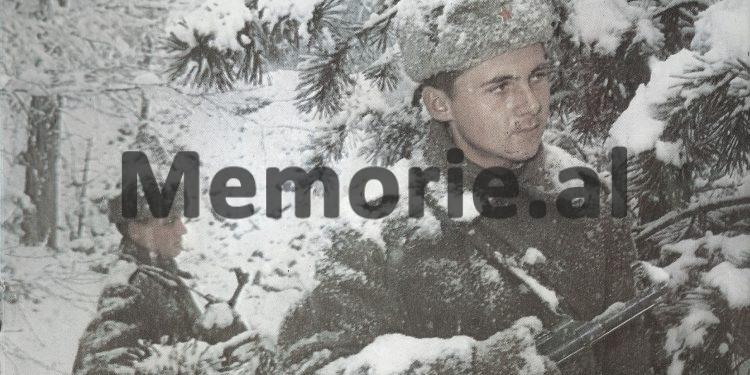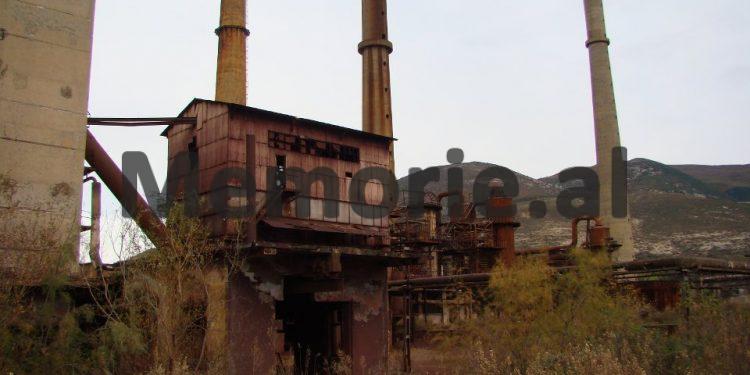By Najada Pendavinji
– The shocking testimony of Fejzi Zenelak: “I didn’t have a crust of bread, as my family was poor and I never went to prison, I experienced the most terrible tortures-
Memorie.al / I didn’t have a crust of bread, the tortures were among the most terrible. When the time came for the arrested to go to the shelf where they left the food from home, the policeman did not stop at Fejzi Zenelaku because he knew that he had nothing. But he, in order to have an excuse to go out, sometimes left a basket of bread “as much as you could”. That’s what it was like to come from a poor family, like his, that had no way to send food to the prison. Fejzi Zenelaku tried the heavy weight of handcuffs when he was only 17 years old, because he had thought of escaping, without ever putting his plan into practice. He spent seven years of hard work and constant hunger in prisons, where, however, he slept soundly, because that’s how someone “who has a clear conscience” sleeps!
Mr. Fejzi, what is your story and how and why were you convicted?
My story begins in 1964, I was 17 years old, when I got to know life behind the crossed bars of the communist prison. Like thousands of Albanians, who tried the system of punishments and executions of this regime, which did not choose its victims, be they peasants, workers, intellectuals, generals, women and children, I also found myself quite by chance, within the persecution and communist hatred.
My punishment comes as a result of an attempt to escape abroad, more precisely a thought or a dream, to leave the poor and isolated Albania of that time. I say an opinion because it was not realized as an action and was left in silence, until the moment came when it was discovered by the State Security, which did not even allow you to dream.
So I was sentenced to 8 years in prison for trying to escape abroad, which, I can say at that time, was one of the most serious charges since they could not accept it and allow you to leave Socialist Albania.
Just because you thought about escaping…?!
Yes…as I told you a little above, there were three of us very young friends, I was a teenager, not yet 18 years old, from the village of Ponçare i Devolli, where in the cooperative, we did not find ourselves, we worked hard and only for a living, but even that with a ration. Seeing the neighboring village of Shatë, across the border, which did not exceed 30 houses, one better than the other, with asphalt, where over 100 luxury cars entered and left a day, which for that time, was unimaginable and compared to the village ours, which even though was 5 times bigger in number, we passed only by donkey, so it was a desire to see more.
All of this, but also many other things forbidden in that system, made us think that there is something wrong with us, and that everything must be done to get out of that situation, not excluding it the possibility to cross the border. This thought and this dream continued for weeks and months: the closer we got to that village, the more we left it, until one day, when we remembered that our families could have consequences, even serious ones, we finally gave up.
We decided to wait until we matured and grew up a bit more. And then we would go to some state enterprise, where the salary would be better. But we didn’t know that the communist regime had the ability to go so deep as to listen to the voice of reason and become paranoidly afraid of a group of very poor rural teenagers when we were looking for nothing but a better job well, without harming anyone.
So on the very days when we decided to give up, on July 30, 1964, when I was returning from the field where I was harvesting wheat, I saw two cars of the District Interior Branch and all those unknown officers and civilians, as well as in distance fellow villagers pale, as if without blood on the face.
I was told that I should go with them just for clarification. When I entered the large, covered car, I noticed that there were two other friends: one that we worked together, but that we had no connection at all, and the other that we had talked about escaping, Pëllumb Malka. Although it was almost getting dark, I noticed that we did not stay in the locality as we were told at the beginning, not even in Bilisht, but we stopped in Korça, at the Department of Internal Affairs, where the investigation immediately began…!
What happened during the investigation?
I was too young to understand what the investigation of that time really was. I didn’t understand what was happening because they told us that they took us only for clarification, which lasted for almost 1 and a half months. When we stopped at the Internal Branch, they did a detailed check on me, where they found a “Voice of Youth” newspaper of that time, 50 ALL and half a comb. They gave me two blankets and put me in cell no. 3.
Tired, overwhelmed after I had completed two norms, but above all completely helpless, I had fallen asleep and who knows when I would have woken up, if the door hadn’t been opened. “Get up”, two policemen told me. “What do you have?”?! “Come on, they’re looking for you upstairs in the office.” When I entered the office, I found in addition to a burly civilian who, as I found out later, was Jani Naska, head of the Internal Affairs Branch, and a major officer.
They sat me on a bench and the first questions they asked me were: “Tell us Fejzi, how old are you?” What do you have in your family? What about relatives”? At that time, I thought and knew that they would like what I told them, since I came from a family sympathetic to the National Liberation Movement. And I answered: My uncle was a partisan and he was also a communist, the dajallars were participants in the National Liberation Movement and, up to me, as a member of the Union of Youth, a sportsman and a worker like no other.
“Well,” he told me, “that’s why we’re sorry and we don’t want to sacrifice you, but you also have to help us.” “Tell me how”? “Yes, here, tell us what the work had to do with the son of Ismail Malka, who was convicted as an opponent and enemy of the Party! ”If you tell us this,” said the head of the branch, Jani Naska, “for the sake of the children, then you will go home.”
As he said this, I reasoned that this tolerance towards me would turn into brutality and harshness towards the friend. I became a man and told him that we are the same age and, regardless of who he was in exile and who he was, we were friends.
Here the situation got heated and the officer who was by Jani Naska’s side, stood up and put the fingers of both hands in my hair and shook me for a moment. “No, leave it,” said the head of the branch. “Okay Fejzo, I offered you an opportunity. You will not benefit, your work,” he said. That’s it, we’re done. The bell rang; the police entered and took me back to cell no. 3.
I had heard that whoever has a clear conscience “sleeps like a heifer without a pillow under his head”. That happened to me too. The next day around 10:00, I was taken to another office, where in front of me was a short, slightly chubby, very charming man.
-“Hey, Fejzo, what’s going on with you?”, he said to me and then continued: “A person is not punished for a word of mouth, isn’t it, especially since he’s young, he’s like the north. Without telling me, would you really run away, supposedly for a better life, or were you just hinting”?! “Actually, we had given up that idea in time and left it to go to a state enterprise when we grow up a bit.” “That’s all”?! said the unknown official. “Painful, but you have to leave a mark,” he continued
So I did, somehow realizing that I had signed up for a very difficult future. The next day, I face the investigator of my case. Looking at the report of the previous day, he was clear about the progress of the situation I was in and told me: “So you signed that together with Ismail Malka’s son, Pëllumbi, you dreamed of another, supposedly better world “. “It’s everyone’s right to dream,” I told him, a little shocked.
“Uhh! In addition, you have also committed the criminal offense of agitation-propaganda”. It’s not true, I was disgusted. “Then look here, you said that: Life in America is getting better, that workers there are paid more than in Albania and that people there eat in restaurants, they don’t pay for bread at all”. “That’s what everyone says,” I returned. “As always, you understand what you are talking about”?! ‘Everyone, including you, fellow investigator,’ I continued again.
Here he acted like a fool and tried to hit me with a metal stick that was apparently Castile for such occasions, but refrained. After three days, they put an ordinary prisoner from the city in my cell, in order to get some information, but he told me what he had come there for and told me that:
“If you have anything harmful, don’t tell me at all, no matter what the government says. That I know that you who are accusing you of politics are good, special people that you should take off your hat. That’s what my father always says.” Four days passed and they took it from me.
Were you tortured during the investigation?
The violence used against the convicts, i.e. against us, was done in various forms. So I was also tortured, but not directly. I remember during the investigation, they gave us food once every 24 hours and allowed us only once for our personal needs. I was hungry, exhausted, since the bread they brought did not satisfy me with any meal.
My family was poor; they could not help me with food, as was the case with other prisoners, who kept the food brought by their family members on a shelf for later. So, as an excuse to go out, I decided to leave a loaf of bread on that shelf as well. When it was time to leave, the policeman did not stop at my cell, as he knew very well that I had nothing to take…!
But I, with that trembling voice of mine, tell him: I also have something. When I go there I checked but I wasn’t looking at it. I insisted on finding my bread, which was as much as “yeast”. “Quick”, says the policeman, seeing what I was looking for, he turns to me: “Eh, you, you call yourself a politician…”! It was the second time I was hearing this word, with an important connotation.
Meanwhile, he grabs half a loaf of bread cooked by him and drops it into my hands. “Take…”! I remained puzzled saying: It is not mine. “You are not stealing it, I am giving it.” I took it, went to the cell, but the first bite I took stuck in my throat. I returned it, walking to the place empty-handed but with a clear conscience.
I remember a case that I remember, a prisoner who spent 11 months in the intensive interrogator, when while he was tied to the chair, in his jacket pocket, a mouse had found shelter, which had also multiplied with other mice little ones.
He stayed for a relatively long time with the rats who accompanied him during the interrogation. These were really the situations that best show how a person is turned into a very miserable state by that dictatorial system.
How did your trial go?
After the end of the investigation, the trial took place with open doors. The participants were my family members, other people and the jury, where the judge was Eleni Selenica. In this trial, two witnesses appeared. The first was the party secretary in our village and the second was the friend with whom we had talked about the escape, who had spied on us at the State Security.
It was difficult to listen to the testimonies of two people who knew us very well, especially the friend, who thought like us, but turned against us. The word that the first witness said was: “I know that Fejzi Zenelaku has been a good worker, a youth activist, a good athlete, but lately signs of arrogance and stubbornness have been noticed”! I was sentenced to 8 years in prison, for “trying to escape abroad”!
Now, the communist system was set up in such a way as to find as many people as possible who put the Party above everything, i.e. above life, family, society, freedom. The friend who spied on me, even to this day, has not come forward and told me the reason why, but I had a conversation with his wife, who communicated to me that he regretted it…! Better late than never, but lost our relationship and society, only for some benefits which can defile your human value and dignity.
Where did you serve your sentence?
After the end of the trial, we are taken to the boxes inside which were 16 men, rooms used to collect the convicts, who would be distributed in the labor camps of the communist regime. Here I remember that they put me in one of the dungeons of Korca, which were really terrible, for almost 5 days.
There I found a former war veteran, Stavri Çuti, who had received seven wounds during the War and was sentenced to 7 years in prison, for “agitation and propaganda”, he was elderly.
The dungeons were cold, you couldn’t stand up because you hit your head on the stairs in the middle, but you couldn’t even lie down because the dungeon was made of stone from the river, it was so cold. From here, they first took me to the Laçi camp, where I stayed for almost two years and worked as a plasterer there.
There in Laç, I found intellectuals, Catholic priests, vice-ministers, directors of the Monarchy period, etc. A manly environment had been created, where morality was practiced, where chess was played, books were read and we young people were inspired by them. Such were: Tomor Dosti, Luan Koka, Bardhosh Gjonzeneli, etc.
How many convicts did that camp consist of?
The camp had a total of about 1000 men who, depending on the occasion, worked in two shifts. Since I was a village boy, who only knew how to work the land, there I found a supportive collective, from whom I was educated in the spirit of reading books and intellect.
They always emphasized that; you enjoy reading, it’s different when you’re free and different in prison, but I couldn’t make this distinction, because there it was the first time I saw so many books and people who also learned foreign languages in a self-taught way.
Also, I have seen that imprisoned intellectuals were used to translate the books of the best artistic authors, but also those that the regime needed. The book created such a “smell of freedom” that we started to call each other by nicknames, mainly with the names of the characters in the books we were reading. Look, our contact with books came in several ways: there were the books allowed by the command which were in the library of the Laçi camp, and the other was the introduction of books secretly by the prisoners.
This category of books was more enjoyable, as they were works of great writers and did not have a propaganda character. It was difficult to get them in, but it was even more difficult to protect them from the State Security spies who were afraid of books and free human intelligence.
Also in this camp, a film camera was introduced, where we watched films as if we were hungry, at a time when in the village, we were sitting with torn clothing and no longer watched films. Here in Laç, I met Esat Elezi, from Kukësi, who helped me with textbooks, to finish high school in prison.
As it usually happened, in every camp or prison of the regime, if they targeted you, they squeezed you well and you couldn’t escape their clutches. The same thing happened here. After Laçi, they took me to Elbasan, where I worked in the construction of the Cement Factory. I didn’t stay there long and after that, they take me to Spaç, where I experienced the horror of working in the camp galleries.
Did you work in the mine and how were the conditions there?
I was the right age according to them to work in the gallery, so I also tried working as a miner in the camp gallery, which was exhausting. But it’s not that I didn’t care, since I had to work to support myself because I came from a very poor family, which couldn’t feed itself, no longer had responsibility for me.
So, I had to realize the norm. There were cases when we prisoners, due to heavy work, could not achieve the norm and as a result the work cycle was broken. Working in shifts was extremely torturous. There have been cases where accidents have occurred which were also a result of fatigue, but especially when the rules of technical security were underestimated by us prisoners.
How many people were there in the silos where you slept?
In 1971, when I went to Spaç, there were 5 silos built with prefabricated pupulite, where each silo housed 200 to 1000 people.
Was there torture there?
Regarding the tortures that took place in the camp, I have noticed a case where one of our friends was beaten by the police after he refused to enter the gallery, he was Bajrami from Berat. They had bled him so much that it was impossible to tell if it was him or not. I mentioned this situation to you, due to the very fact that this violence against him served for the political prisoners to rise up in revolt, trying to tear down the fence of the internal siege.
I can say that this situation resembled the great revolt of ’73. The commander of the camp, Çelo Arrza, took measures to calm down the prisoners. The Spaçi camp, as many other prisoners may have described, is one of the most horrible camps of that system, although the food was good, the work, violence and mistreatment were severe.
Tell me a poem you wrote during your years in prison?
Living in the prisons of the dictatorial regime requires invincible strength which, you try to find everywhere, you need to be caught somewhere to stay alive. And you know that most of us prisoners found inspiration, hope in the most common genre of creativity, which was poetry. There you could write anything, about what you were experiencing in an instant, about what you saw and above all about the heavy prison life which would weigh on my shoulders even after the end of the sentence.
So a good part of the poems that I have published today, especially the first book, were written during the time I spent in Spaçi prison. You must know well that it was difficult to hide them from the tracking, surveillance and investigative structures of the system. Therefore, out of fear of finding them, I tried to learn them by heart. Some others I wrote on cigarette papers and hid in my jacket collar.
How do you remember the release?
Man appreciates freedom and knows its value only when he has been behind bars where even the flight of a bird seems a miracle. For the day of release, I have special impressions because I was looking forward to it, but I can say with full conviction that I did not feel any special joy. It may seem unbelievable to you, what I am telling you, but for me it was the transition from the small prison of Spaç, to the “big prison of Albania”.
Why do I say this? Because the loss of freedom does not come as a result of being locked up in a place called a prison, but also from isolation, within a communist country, where freedom was deprived from conception. On the day I was going to be released, my friends found out and, to relax, they intervened by talking to the camp doctor, who was known to be a prisoner, to give me a medical report.
He issued the report, but on the fourth day we had an incident: someone had reported to the command about the fake report. So the military doctor comes to assess my physical condition. The doctor of the camp begs me saying: “Don’t leave me in the mud”. In order not to be found out, he tells me that he has to give me a needle because the punishment would be severe for him.
Here I doubted and thought to me that they would do something to me on the eve of release, since you cannot imagine what could happen to you from moment to moment, from them. But in all my life no one had suffered the slightest thing because of me, so I could not allow it and I thought: whatever happens, no one should suffer because of me.
I went to the infirmary, did the needle and my condition worsened, but within 1 hour everything was back to normal, we both survived. I was released in 1971, returning to my hometown, Ponçare, where my family members were waiting for me and where I would face life after prison…! Memorie.al




